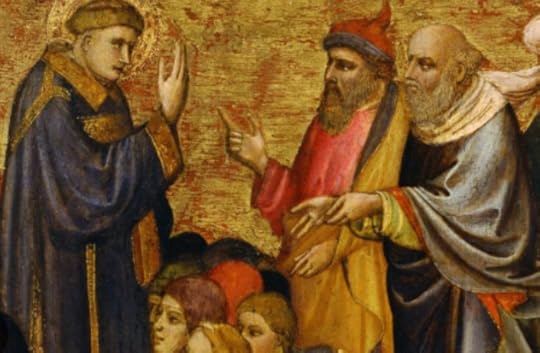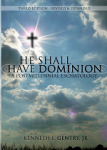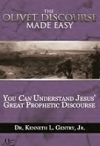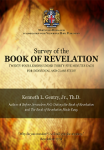INTRODUCING THE TWO WITNESSES (4)
 PMW 2024-069 by Kenneth L. Gentry, Jr.
PMW 2024-069 by Kenneth L. Gentry, Jr.
I am pressing on in a study of the two witnesses of Revelation (see previous entries). Adding to the previous study I now would point out that not long after Paul’s introduction in Acts (Ac 8:1), he quickly becomes its leading character (Ac 9:1ff). And though he will be the missionary to the Gentiles (Ac 13:46; 14:27; 15:7; 18:6; 22:21; 28:28; Ro 1:5; 11:13; 15:16; Gal 1:16; 2:2, 8; Col 1:27; 1Ti 2:7; 2Ti 4:17), everywhere Paul goes on his Mediterranean mission, even when taken to Rome in chains, he seeks out the local Jewish community to convince its membership that Jesus is their Messiah (13:4; 14:1; 16:13; 17:2–3; 28:23). Regarding the last chapters of Acts, it has been stated: “it has often been observed that in Luke’s narrative world Paul’s arrival in Rome takes place within the period of ‘testimony’ [maturia] in which, like Jesus himself, his followers are hauled before the ‘kings and governors’ (e.g., Agrippa, 25:23-26, 32; Festus, 25:1-12).”
After Saul the persecutor of Christians becomes Paul the proclaimer of Christ (Ac 9), Herod Agrippa I beheads James (the brother of John) in Ac 12:1–2. Though no reason is given (other than “he saw that it pleased the Jews,” Ac 12:3), during the Lord’s earthly ministry he and his brother John want to call fire down upon the Jewish cities who resist his message (Lk 9:54). And since he is one of the original hearers of Christ’s Olivet Discourse against the temple (Mk 13:3), he surely preaches against the temple himself. Later in Ac 13 the Holy Spirit sets apart two men (13:2; Saul [Paul] and Barnabas) for a similar witness to the diaspora Jews (13:5, 14–17, 26–44) — and with similar results (13:44–46a). There Paul announces: “we are turning to the Gentiles” (13:46b–47), because of the Jewish resistance (13:45). Just as Christ commands his prophets to shake off the dust of their feet in testimony against rebellious Israel (Lk 10:11; 9:5; Mt 10:14), Paul and Barnabas do so (Ac 13:51). As the enemies of Christ, the Jews will be (spiritually) bowed down to lick the dust of their feet (cf. Ps 72:9; Isa 49:23; Mic 7:17; cp. Rev. 3:9).
Among the earliest NT documents are Paul’s Thessalonian epistles (AD 50-51). In 1Th 2:14–16 Paul condemns the Jews for killing Christ and hindering the apostles “with the result that they always fill up the measure of their sins.” He alludes to AD 70 and the destruction of the temple when he asserts “wrath has come upon them to the utmost” (cp. Mt 23:32, 34, 38-24:2). As noted by one NT scholar: Paul “might well have thought that total war between Rome and Israel was about to break out” even as he writes (cf. J.W. 2:11:6–12:1 §222–27). Later the Jews also charge him with speaking against the temple (Ac 21:28; 25:8), which troubles his friends who warn him not to go to Jerusalem (Ac 21:4, 10–11).

He Shall Have Dominion
(paperback by Kenneth Gentry)
A classic, thorough explanation and defense of postmillennialism (600+ pages). Complete with several chapters answering specific objections.
See more study materials at: www.KennethGentry.com
After the record in Acts James the Just (not John’s brother) is slain in Jerusalem in AD 62 because of his declaring “with a loud voice, ‘Why do ye ask me concerning Jesus, the Son of Man? He himself is sitting in heaven at the right hand of the great power, and is about to come [mellei erxesthai, i.e., soon] upon the clouds of heaven’” (Eccl. Hist. 2:23:14; cp. 4:22; Recog. 1:66-70). This language not only asserts Jesus’ deity, but the temple’s destruction (cp. 1:7; Mt 24:30 //; 26:64–66). Consequently, the Jews throw James off the pinnacle of the temple with the result that “he became a true witness [martus], both to Jews and Greeks, that Jesus is the Christ. And immediately [euthus] Vespasian besieged them” (Eccl. Hist. 2:23:18).
Some argue that “the predictions of the destruction of Jerusalem have a natural Sitz im Leben in the missionary preaching of the church to the inhabitants of the city,” so that “the theme of the destruction of Jerusalem . . . must have been an important part of the preaching of the early church.” Other scholars agree, noting: “The prophecy of Jesus that he would destroy the temple was one of the elements of the faith and message of the Jerusalem Church, cf. Acts 6:14.” We should realize that though the Gospels are dealing with issues occurring pre-AD 30, much earlier than AD 70, they are written closer to the AD 70 era and are being read and preached during that time.
So here in Revelation 11:3ff John is presenting the matter of Jerusalem’s judgment in a court drama requiring the appropriate “two witnesses.” Based on a comparison of Revelation 11 with Jer 4–6, Alan Beagley presents the basic idea regarding the two witnesses: “All this suggests that John’s description of the ministry of the witnesses may well be intended to signify that their message was one of judgment on Jerusalem and the nation of Israel.”
To be continued, unless Kamala Harris is speaking on the radio. Then I would set aside time to listen to her to see if I can figure what in the world she it talking about. Word salads are often a lot of fun.
Click on the following images for more information on these studies:



Kenneth L. Gentry Jr.'s Blog
- Kenneth L. Gentry Jr.'s profile
- 85 followers



